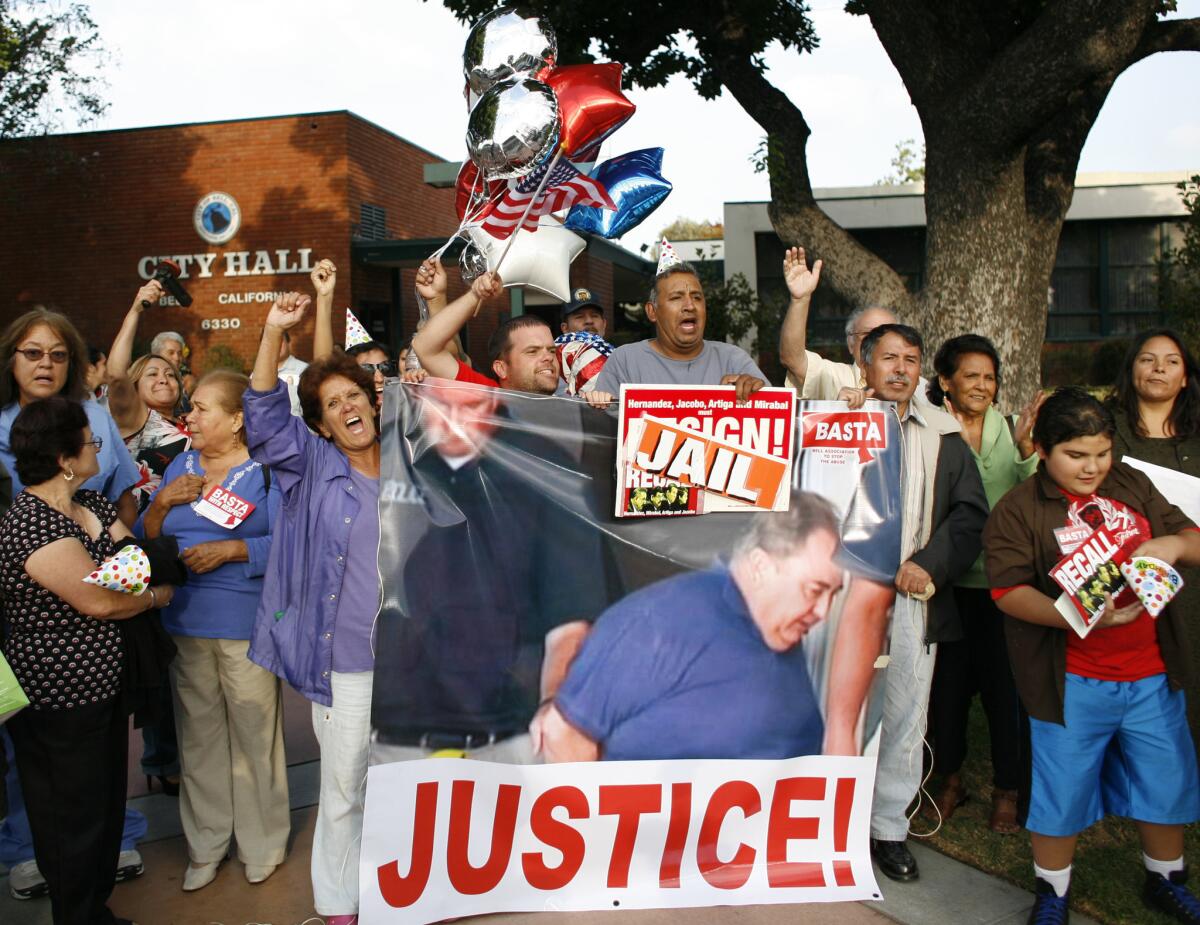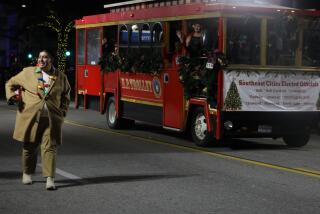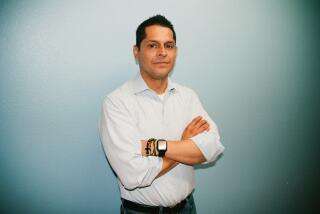How Bell hit bottom

The new boss kept his office spartan and impersonal, the walls stripped of photos, the desk conveying no hint of his life beyond the red-brick walls of City Hall.
It was 1993, a bleak, recession-bit year, and Robert Rizzo arrived in Bell trailing the vague whiff of scandal. His last city administrator job, in the high desert city of Hesperia, had ended badly, with accusations that he’d steered city improvement funds toward salaries.
But the Bell officials who hired him did not dig deeply into his past. They needed someone fast, and Rizzo, then 39, came cheap. His starting salary was $78,000, which was $7,000 less than his predecessor had made.
FULL COVERAGE: High salaries stir outrage in Bell
“He was willing to work for the least amount of money,” said then-Councilman Rolf Janssen. “That was what attracted me and several other council members.”
Now Rizzo and seven other Bell leaders past and present are charged with looting more than $5.5 million from one of the county’s poorest municipalities. It is a hydra-headed scandal that has spawned seven federal, state and county investigations and transformed a forgotten suburb into a synonym for rogue governance. It has resonated as a morality tale in which Rizzo is cast as a greed-crazed, cigar-chomping puppet master who cheated his way to an $800,000 salary and a 10-acre horse ranch.
How Rizzo evolved from an obscure civil servant into what a prosecutor called an “unelected and unaccountable czar” may never emerge in granular focus. But the broad contours are clear. Ambition and opportunity aligned in a place that allowed him to be both ever-present and invisible.
The normal checks and balances, from a robust local press to engaged civic groups, had largely vanished before or during Rizzo’s long reign as city administrator. And the grim climate in which he arrived made him seem, for a time, like the man Bell needed.
Had he retired six or seven years ago, he might have been remembered as a reclusive technocrat who saved the city from financial ruin and made it purr. People talked about how pretty the parks were, how efficiently trash was removed, how swiftly gang graffiti was painted over.
Just last year, a police captain named Anthony Miranda ordered T-shirts for Neighborhood Watch participants imprinted with a prideful description of the 21/2-square-mile city: La perla del sureste.
The pearl of the southeast.
“We believed it,” he said. “Compared to our neighbors, Bell was the place to be.”
--
In the immense geographic chasm between downtown Los Angeles and Orange County, Bell is one of those places the tour books skip entirely -- the freeway-culture equivalent of flyover country, a smudge of urban gray.
Rizzo’s touches are everywhere: a big skateboard park, a miniature golf course, pristine playing fields. In a place both cramped and crime-wary, the parks are stringently fenced, squeezed between tenements or beside busy streets. At an open-air gym along Gage Avenue, people breathe the exhaust of passing traffic as they pant atop stationary bikes.
Like other cities in southeastern L.A. County, Bell flourished as a white middle-class enclave during the Cold War manufacturing boom. There was a local newspaper, the Industrial Post, and a host of active social service groups: Kiwanis and Rotary clubs, Masonic and Moose lodges.
The decay of the region’s industrial spine in the 1970s and ‘80s -- the closure of tire, auto and steel plants -- left thousands without the well-paying jobs that built the area. This coincided with a massive influx of Latinos, many of them undocumented.
The service groups withered. Voter participation became “abysmal,” said John Bramble, who was city administrator in 1990, a year when 669 votes -- in a city of 34,000 -- could win a City Council seat. Only five or six people showed up for neighborhood meetings. Bramble said he would meet with a handful of World War II-generation seniors at a burger place to talk about city business, but age and illness thinned their numbers.
“Things started to deteriorate,” Bramble said.
By 1993, Bell’s fortunes were at a low ebb. The California Bell Club -- once the state’s largest poker parlor and the source of $2 million in annual revenue for the city -- had closed. At City Hall, council members could feel the springs under their patched leather seats.
The Industrial Post, in existence since 1924, went under. Jay Price, the beloved 78-year-old mayor, an institutional fixture who had joined the council in the 1950s, died of heart failure. And Bramble announced that he was leaving for a job in Colorado.
Interviews with potential replacements began immediately, though the city didn’t have the money for an exhaustive search.
Bramble recalled that interest in the city administrator’s position was scant.
“I don’t think people were willing to take a job where you were constantly cutting. That was the story of my last three years in Bell,” he said. “My guess is they were happy to have anybody.”
--
Rizzo quickly developed a reputation as a micromanager who meant to save the cash-strapped city by pinching every penny. He laid off workers and contracted out services. He gave an expensive-to-maintain bridge to the neighboring city of Vernon. He installed cheaper, brighter streetlights.
At the Police Department, squad cars racked up 200,000 miles instead of being replaced after 100,000. New cars received drab gray door emblems instead of multi-colored ones.
Janssen, the former councilman, said Rizzo put the city on stable financial footing and took a keen interest in its image. He made sure plenty of hot dogs were available at city events and insisted that every child, not just the stars, receive a trophy in the soccer and baseball leagues.
He lived near the ocean in Huntington Beach, 30 miles from the city he ran, and seemed to shrink from personal attention, reluctant to mix even as president of the Chamber of Commerce. In the fraternity of local city managers, he was rarely seen.
Diminutive and rotund, Rizzo was self-conscious about his appearance. Behind his back, people called him the Penguin, a reference to the “Batman” villain. He liked to mention his bachelor’s degree from UC Berkeley and said that everything he’d achieved was the result of dogged effort.
Under Rizzo, people began saying the city looked better than it had in years. Marial Sanders, a real estate agent and property manager in Bell, said prospective homebuyers sometimes told her they were torn between Bell and nearby Downey, a much bigger city. “I thought, ‘Wow, Bell has come so far, we’re being compared to Downey.’ ”
Only rarely did Rizzo draw attention to himself, as on one election night at City Hall. People who were there recall that he had too much to drink. Peter Werrlein, a former mayor who had served prison time for holding a hidden interest in the poker club, said he confronted him.
“You’re drunker than a hoot owl,” Werrlein recalled telling Rizzo. “You’re going home.”
When Rizzo tried to argue, Werrlein said, he got the city administrator’s attention by striking him across the face with a half-open hand. “I whacked him and said, ‘Let’s go.’ I think he knew I’d reached the end of my patience.”
To some, the plainness of Rizzo’s office spoke to his willingness to make sacrifices along with the city.
When Police Chief Michael Trevis asked why he didn’t hang photos, however, he said he got a different explanation. “When you put things up, you’re telling people you’re comfortable,” Trevis recalled Rizzo saying. “I want people to know I can leave at a moment’s notice.”
In his stark office, the sole reflection of his personality was a little television on which he followed the stock market. “It was always on,” Trevis said. “That’s Bob. We were not used to that, but we were broke, we were busted, and it took a numbers guy.”
Once, he said, Rizzo invited him to look at budgetary pie charts. They showed that although the Police Department swallowed more than half the city budget, it generated less than 10% of the revenue.
“He said, ‘You guys are costing me this and you’re only bringing in that? You’re not holding your own,’ ” Trevis said. He said Rizzo encouraged officers to write more tickets and impound cars, and he monitored which cops were “earning their way.” He said Rizzo justified the tactic with a veiled threat: “Hey, if we don’t do this, we might not have a Police Department.’ ”
Trevis said he believed revenue-oriented policing was unethical, and he waged “passive resistance” against it. He said the climate of constant layoffs lent camouflage to Rizzo’s steady accumulation of power.
“It started to be anyone who disagreed with him, they were not around much longer,” Trevis said. “Bob is of the belief that people are either assets or liabilities, and if you are a liability, he will find a way to jettison you.”
Trevis said Rizzo found grounds to get rid of him in 2002: He had violated his contract by taking outside security work without permission. “He found out and he twisted me,” Trevis said. “As one of the guys told me, ‘When we saw he could get to you, he could get to any of us.’ ”
Bell Police Sgt. Art Jimenez, a 12-year veteran of the department, described Trevis as “the last chief to say no to Rizzo.”
The chief’s ouster was followed by a deeper power shift in 2003, as council veterans Janssen and George Bass -- pillars of the old guard -- left office. In their place came two of Rizzo’s future co-defendants, George Mirabal, who ran a mortuary, and Oscar Hernandez, owner of a corner grocery.
Whether by chance or design, Rizzo found himself with an increasingly free hand. More than anyone, it was Hernandez who came to symbolize the new, more manipulable City Council. A former farmworker, he had emigrated from Mexico in his teens. With only an elementary school education, he could barely read the papers that passed across his desk at City Hall. And yet he became Rizzo’s go-to man, prosecutors say, putting his signature to complex documents and to papers that obscured the city administrator’s increasingly hefty salary.
Though Rizzo’s office remained threadbare, his private lifestyle was acquiring a majesty undreamed of in the working-class city he ran. His salary jumped from $250,000 in 2002 to $300,000 in 2004, the year he bought a lavish horse ranch in Washington state. Few in Bell knew it, but he had become a breeder of thoroughbreds.
Then, on a sleepy day after Thanksgiving in 2005, a little-noticed election was held. The single question on the ballot: whether to turn Bell from a general law city into a charter city. By some accounts, it was a change Rizzo had aggressively pushed.
Passing with just 336 yes votes, the measure lifted salary caps on council members, who went on to approve further dramatic pay raises for Rizzo and for themselves.
His salary jumped to $442,000 that year. It kept climbing until, by last summer, Rizzo was making nearly $800,000, with a benefits package that brought his annual compensation to $1.5 million. He had brought in an assistant, Angela Spaccia, who was paid nearly $400,000 a year, and a police chief, Randy Adams, who collected $457,000.
Council members, for their part, were making nearly $100,000 a year in part-time positions that in most small cities paid a few hundred dollars a month.
Meanwhile, police were impounding cars at a furious clip, looking for broken taillights and missed turn signals as a pretext to pull drivers over. In a city where an estimated half of the residents are illegal immigrants, unlicensed drivers were easy to find. Bell charged them $300 to get their cars back. Fearing deportation, they were unlikely to complain.
“That was the reason we were able to do it for so long. And when they did complain, there was no one to complain to,” Jimenez said. “There were single officers impounding eight cars a day. It was out of control. If they weren’t impounding cars, they felt like they weren’t working.”
Earlier this year, before the scandal broke, Rizzo crashed into a neighbor’s mailbox while attempting to pull into his own driveway, and police found him with a blood-alcohol level more than three times the legal limit. He pleaded guilty and was sentenced to a first-offender alcohol-awareness program.
Now, he and his assistant, along with six current or former council members -- Hernandez, Mirabal, Teresa Jacobo, Luis Artiga, George Cole and Victor Bello -- are charged with bilking the city out of millions of dollars.
Rizzo declined to be interviewed for this story. His lawyer, James Spertus, said the corruption charges are unfounded and that his client did much good for the city while earning comparatively little for years.
“He took over a city that was deeply in the red,” he said. “Rizzo made five-figure salaries until the late 1990s. It was way below the median for his position.”
Trevis, the former chief, now speaks nostalgically about the city he remembers. There were big-city problems such as gangs and graffiti, but he regarded Bell as a “little Mayberry,” a tight-knit and friendly place.
Most of those swept up in the scandal are people he’s known for years. He recalled how he’d steer hungry people to the church on Gage Avenue where Artiga, its pastor, had a reputation for feeding them. How Hernandez gave groceries on credit to people who couldn’t pay. How Mirabal, the funeral director, buried people at deep discounts so their families wouldn’t have to hold car washes to raise the money.
Trevis thinks he knows what went wrong in Bell. It was the same thing, he said, that sometimes happens to happy families that come into a big inheritance.
“They got poisoned with money,” he said.
--
In Bell, purging the remnants of the Rizzo era has become an obsession, one that can assume strange, even ritualistic forms. Bell’s merchants have rebelled against the Chamber of Commerce, where Rizzo was a longtime member of the board. The organization came to be seen as an extension of his power.
On a recent night, hundreds of merchants crowded into a banquet hall to inaugurate an alternative, the Bell Business Assn. They took turns detailing the abuses they had suffered at the hands of City Hall: arbitrary fees, long waits for permits and the ever-present threat of code enforcement to deter potential complaints.
The association’s first president, tire shop owner Jose Vazquez, compared Rizzo’s management of the city to the Mafia: “This is like ‘The Sopranos.’ ”
In a place where so many feel betrayed, a renewed commitment to fair dealing seemed the need of the moment, and so the association’s first directors were asked to step forward. Up came the men and women who run the tire and bail bond shops, the boxing gym, the meat market and the restaurants. They crowded the stage and raised their right hands, solemnly promising to perform their duties honestly.
At one point, Anthony Miranda, the acting police chief, took the stage and announced that the Police Department had made more changes in the last three months than in the previous six years.
“When we come out of this, we’re not going to be gold or silver -- we’re gonna be titanium as a community!” Miranda said. “Untouchable!”
Cheers greeted his speech. The reception was chillier for interim City Administrator Pedro Carrillo, who has moved his furniture into Rizzo’s old office, hung the bare walls with pretty satellite pictures of the city and promised openness and accountability.
The people of Bell, he told the crowd, would rise together or fall together. The remark elicited boos. From a different speaker, it might have rung out as inspirational, a call to solidarity. But many in the audience didn’t trust Carrillo. He had worked at City Hall under Rizzo, after all, and reminded too many people of his ghost.
christopher.goffard@latimes.com
More to Read
Start your day right
Sign up for Essential California for news, features and recommendations from the L.A. Times and beyond in your inbox six days a week.
You may occasionally receive promotional content from the Los Angeles Times.







